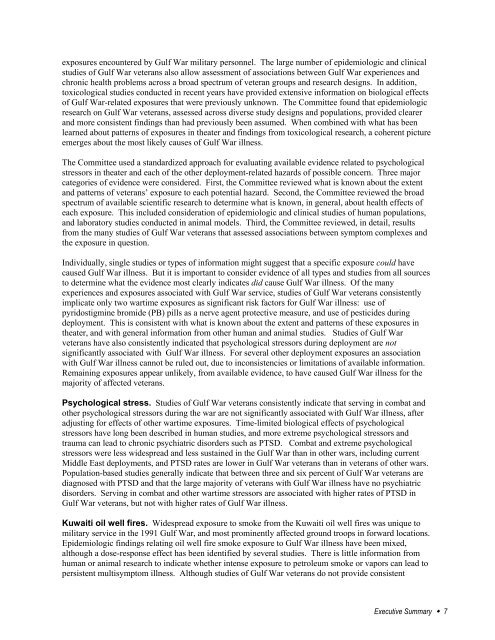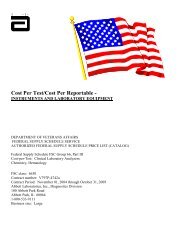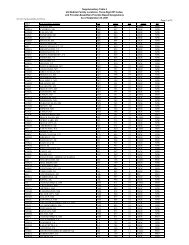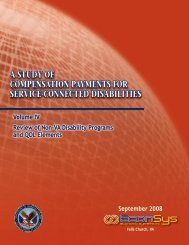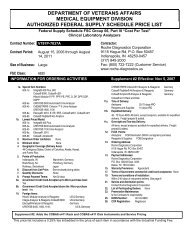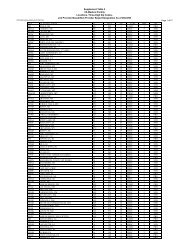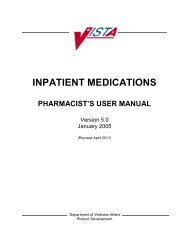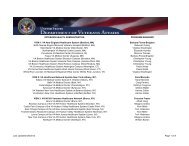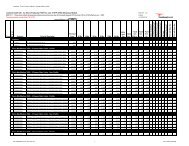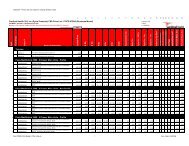Gulf War Illness and the Health of Gulf War Veterans Scientific ...
Gulf War Illness and the Health of Gulf War Veterans Scientific ...
Gulf War Illness and the Health of Gulf War Veterans Scientific ...
You also want an ePaper? Increase the reach of your titles
YUMPU automatically turns print PDFs into web optimized ePapers that Google loves.
exposures encountered by <strong>Gulf</strong> <strong>War</strong> military personnel. The large number <strong>of</strong> epidemiologic <strong>and</strong> clinical<br />
studies <strong>of</strong> <strong>Gulf</strong> <strong>War</strong> veterans also allow assessment <strong>of</strong> associations between <strong>Gulf</strong> <strong>War</strong> experiences <strong>and</strong><br />
chronic health problems across a broad spectrum <strong>of</strong> veteran groups <strong>and</strong> research designs. In addition,<br />
toxicological studies conducted in recent years have provided extensive information on biological effects<br />
<strong>of</strong> <strong>Gulf</strong> <strong>War</strong>-related exposures that were previously unknown. The Committee found that epidemiologic<br />
research on <strong>Gulf</strong> <strong>War</strong> veterans, assessed across diverse study designs <strong>and</strong> populations, provided clearer<br />
<strong>and</strong> more consistent findings than had previously been assumed. When combined with what has been<br />
learned about patterns <strong>of</strong> exposures in <strong>the</strong>ater <strong>and</strong> findings from toxicological research, a coherent picture<br />
emerges about <strong>the</strong> most likely causes <strong>of</strong> <strong>Gulf</strong> <strong>War</strong> illness.<br />
The Committee used a st<strong>and</strong>ardized approach for evaluating available evidence related to psychological<br />
stressors in <strong>the</strong>ater <strong>and</strong> each <strong>of</strong> <strong>the</strong> o<strong>the</strong>r deployment-related hazards <strong>of</strong> possible concern. Three major<br />
categories <strong>of</strong> evidence were considered. First, <strong>the</strong> Committee reviewed what is known about <strong>the</strong> extent<br />
<strong>and</strong> patterns <strong>of</strong> veterans’ exposure to each potential hazard. Second, <strong>the</strong> Committee reviewed <strong>the</strong> broad<br />
spectrum <strong>of</strong> available scientific research to determine what is known, in general, about health effects <strong>of</strong><br />
each exposure. This included consideration <strong>of</strong> epidemiologic <strong>and</strong> clinical studies <strong>of</strong> human populations,<br />
<strong>and</strong> laboratory studies conducted in animal models. Third, <strong>the</strong> Committee reviewed, in detail, results<br />
from <strong>the</strong> many studies <strong>of</strong> <strong>Gulf</strong> <strong>War</strong> veterans that assessed associations between symptom complexes <strong>and</strong><br />
<strong>the</strong> exposure in question.<br />
Individually, single studies or types <strong>of</strong> information might suggest that a specific exposure could have<br />
caused <strong>Gulf</strong> <strong>War</strong> illness. But it is important to consider evidence <strong>of</strong> all types <strong>and</strong> studies from all sources<br />
to determine what <strong>the</strong> evidence most clearly indicates did cause <strong>Gulf</strong> <strong>War</strong> illness. Of <strong>the</strong> many<br />
experiences <strong>and</strong> exposures associated with <strong>Gulf</strong> <strong>War</strong> service, studies <strong>of</strong> <strong>Gulf</strong> <strong>War</strong> veterans consistently<br />
implicate only two wartime exposures as significant risk factors for <strong>Gulf</strong> <strong>War</strong> illness: use <strong>of</strong><br />
pyridostigmine bromide (PB) pills as a nerve agent protective measure, <strong>and</strong> use <strong>of</strong> pesticides during<br />
deployment. This is consistent with what is known about <strong>the</strong> extent <strong>and</strong> patterns <strong>of</strong> <strong>the</strong>se exposures in<br />
<strong>the</strong>ater, <strong>and</strong> with general information from o<strong>the</strong>r human <strong>and</strong> animal studies. Studies <strong>of</strong> <strong>Gulf</strong> <strong>War</strong><br />
veterans have also consistently indicated that psychological stressors during deployment are not<br />
significantly associated with <strong>Gulf</strong> <strong>War</strong> illness. For several o<strong>the</strong>r deployment exposures an association<br />
with <strong>Gulf</strong> <strong>War</strong> illness cannot be ruled out, due to inconsistencies or limitations <strong>of</strong> available information.<br />
Remaining exposures appear unlikely, from available evidence, to have caused <strong>Gulf</strong> <strong>War</strong> illness for <strong>the</strong><br />
majority <strong>of</strong> affected veterans.<br />
Psychological stress. Studies <strong>of</strong> <strong>Gulf</strong> <strong>War</strong> veterans consistently indicate that serving in combat <strong>and</strong><br />
o<strong>the</strong>r psychological stressors during <strong>the</strong> war are not significantly associated with <strong>Gulf</strong> <strong>War</strong> illness, after<br />
adjusting for effects <strong>of</strong> o<strong>the</strong>r wartime exposures. Time-limited biological effects <strong>of</strong> psychological<br />
stressors have long been described in human studies, <strong>and</strong> more extreme psychological stressors <strong>and</strong><br />
trauma can lead to chronic psychiatric disorders such as PTSD. Combat <strong>and</strong> extreme psychological<br />
stressors were less widespread <strong>and</strong> less sustained in <strong>the</strong> <strong>Gulf</strong> <strong>War</strong> than in o<strong>the</strong>r wars, including current<br />
Middle East deployments, <strong>and</strong> PTSD rates are lower in <strong>Gulf</strong> <strong>War</strong> veterans than in veterans <strong>of</strong> o<strong>the</strong>r wars.<br />
Population-based studies generally indicate that between three <strong>and</strong> six percent <strong>of</strong> <strong>Gulf</strong> <strong>War</strong> veterans are<br />
diagnosed with PTSD <strong>and</strong> that <strong>the</strong> large majority <strong>of</strong> veterans with <strong>Gulf</strong> <strong>War</strong> illness have no psychiatric<br />
disorders. Serving in combat <strong>and</strong> o<strong>the</strong>r wartime stressors are associated with higher rates <strong>of</strong> PTSD in<br />
<strong>Gulf</strong> <strong>War</strong> veterans, but not with higher rates <strong>of</strong> <strong>Gulf</strong> <strong>War</strong> illness.<br />
Kuwaiti oil well fires. Widespread exposure to smoke from <strong>the</strong> Kuwaiti oil well fires was unique to<br />
military service in <strong>the</strong> 1991 <strong>Gulf</strong> <strong>War</strong>, <strong>and</strong> most prominently affected ground troops in forward locations.<br />
Epidemiologic findings relating oil well fire smoke exposure to <strong>Gulf</strong> <strong>War</strong> illness have been mixed,<br />
although a dose-response effect has been identified by several studies. There is little information from<br />
human or animal research to indicate whe<strong>the</strong>r intense exposure to petroleum smoke or vapors can lead to<br />
persistent multisymptom illness. Although studies <strong>of</strong> <strong>Gulf</strong> <strong>War</strong> veterans do not provide consistent<br />
Executive Summary • 7


